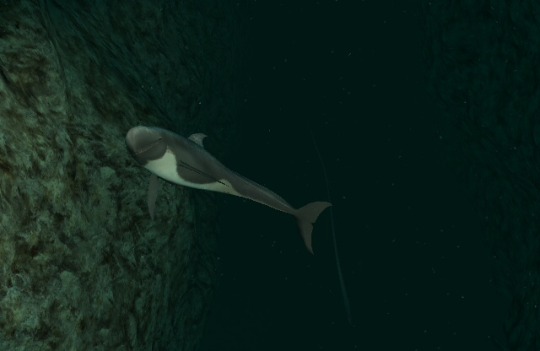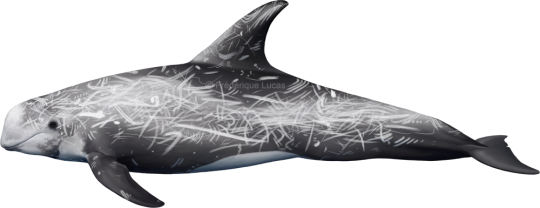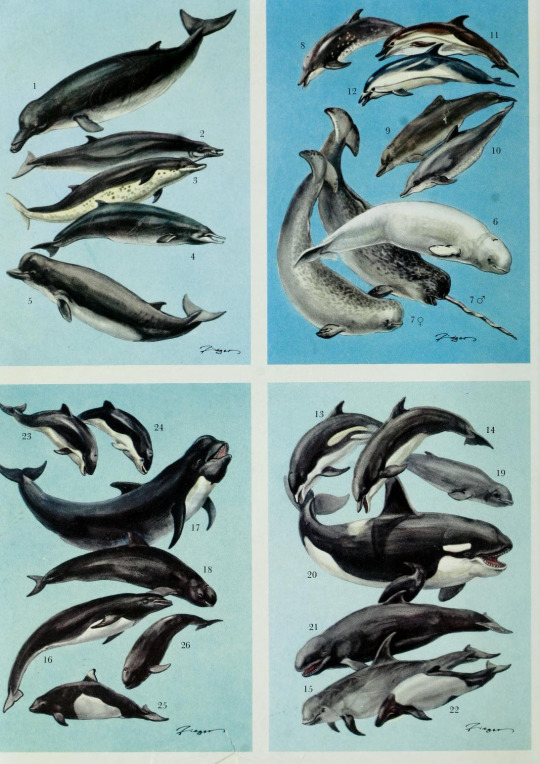#Grampus griseus
Explore tagged Tumblr posts
Note

Trick or treat!!
Treat! Thanks for being the first to come into my inbox for this event :D I wanted to make a ceta doodle and for inspiration chose a random photo from my large reference collection. It turned out to be a picture of a Risso's dolphin who'd lost part of their dorsal fin to a killer whale. It's a photo that has always intrigued me - as do others of a similar nature. What luck they had to escape with their life. And I wonder if they ever think back to that moment? That haunting feeling was something I wanted to capture. It turned into a biiiittt more than just a quick doodle lol but I really love the end result.

The one who got away
Her teeth marked my fin And took a part away A small offer for my life She haunts me anyway
#trick or treat#paintings#risso's dolphin#grampus griseus#killer whale#orca#orcinus orca#orcinus#grampus#odontocete#toothes whale#whale#cetacean#digital art
104 notes
·
View notes
Text

Risso's dolphin Grampus griseus
Observed by anudibranchmom, CC BY-NC
#Grampus griseus#Risso's dolphin#Cetacea#Delphinidae#cetacean#dolphin#North America#United States#California#Pacific Ocean#Monterey Bay
44 notes
·
View notes
Text
youtube

Excerpt from this story from the Smithsonian Magazine:
Risso’s dolphins are deep-diving aquatic mammals that typically swim in groups of 10 to 30 individuals. But late last month, more than 1,500 of them congregated off the coast of central California, creating an unusual and awe-inspiring spectacle for human observers.
Staff with Monterey Bay Whale Watch, a whale-watching tour operator, captured drone footage of the “super pod” of Risso’s dolphins (Grampus griseus) frolicking in Carmel Bay on January 24. The company’s 20-foot, inflatable scouting boat was cruising along the coast south of Monterey, surveying migrating gray whales, when they came across the Risso’s dolphins.
At first, the small crew thought they were seeing a few hundred dolphins. But when they put up a drone, they realized they were actually looking at more than 1,500 of the cetaceans.
“It was just an amazing sight,” says Evan Brodsky, who was captaining the boat that day and captured the drone footage, to��KSBW’s Zoe Hunt. “Just little white dots everywhere, and every single one of those white dots was a dolphin.”
9 notes
·
View notes
Text

Risso's Dolphin Grampu griseus Family: Delphinidae Genus: Grampus Status and Conservation: Least Concern Working on this one was very relaxing. Dolphins take me not so much time and still, the result is nice, So I usually work two every week I'm working on this family. Still amazed at how little I know about this bug family and how interesting its members are. If you want to know more about them, you can join my club here ____________________________ That will be it for this week. If you like the content, leave me some love. Reblogs are also loved. This blog is becoming the most complete source of mammals. Adios!
#risso's dolphin#dolphins#delfin#cetaceans#illustration#drawing#scientific illustration#wild animals#inforgraphics#conservation#artist on tumblr#wildlife#mammals#animals#sea mammals#illo#drawing animals
57 notes
·
View notes
Photo

Risso’s dolphin - Grampus griseus
Length: 13 feet
This gray dolphin has a large, rounded head. As it grows older, its skin gradually becomes white. It has no teeth in its upper jaw and sometimes no teeth at all. It swims the seas leisurely in groups of up to several dozen.
*[White scars]
Adults look white because of countless scars on their skin. All dolphins and whales are injured at some point, but their scars usually fade with time. This species’ injuries leave permanent white scars that gradually turn their entire body white as they get older.
Wikipedia - https://en.wikipedia.org/wiki/Risso%27s_dolphin
2 notes
·
View notes
Text
A Costa Submersa da Península - 200-900ft- fauna
🌊 Fauna da Costa Submersa de Eldara (200-900 pés de profundidade)
🦈 1. Peixes e Predadores Naturais
🔹 Peixe-lanterna (Lanternfish) – Bioluminescente, comum em águas escuras.
🔹 Bloodfish – Peixe predador agressivo, se alimenta de criaturas feridas.
🔹 Swordfish (Peixe-espada) – Ágil e agressivo, usa seu "bico" para caça.
🔹 Cherne-negro (Polyprion americanus) – Predador solitário de recifes profundos.
🔹 Corvina-do-Mediterrâneo (Argyrosomus regius) – Emite sons ressonantes para comunicação.
🔹 Enguia-europeia (Anguilla anguilla) – Se esconde em fendas submarinas.
🔹 Atum-vermelho (Thunnus thynnus) – Predador veloz e resistente.
🔹 Robalo-mediterrâneo (Dicentrarchus labrax) – Caçador oportunista em cavernas e cânions.
🔹 Moreia-mediterrânea (Muraena helena) – Territorialista e agressiva, vive entre recifes.
🔹 Pescada-europeia (Merluccius merluccius) – Predador de lulas e peixes menores.
🔹 Litão (Galeus melastomus) – Pequeno tubarão adaptado às águas escuras.
🔹 Congro-europeu (Conger conger) – Grande enguia predadora que habita fendas e naufrágios.
🔹 Tamboril-preto (Lophius budegassa) – Peixe predador com apêndice bioluminescente para emboscadas.
🔹 Hunter Shark (MM, CR 2) – O grande predador desta profundidade, patrulhando cânions e fendas.
🔹 Quipper Swarm (MM, CR 1) – Cardumes de peixes carnívoros vorazes.
🐋 2. Mamíferos Marinhos
🔹 Harlequin whales – Pequenas baleias coloridas e brincalhonas.
🔹 Killer whales (Orcas) – Predadores sociais que caçam em grupos.
🔹 Tusktooth whales – Baleias com presas afiadas para defesa.
🔹 Baleia-piloto-de-nadadeira-curta (Globicephala macrorhynchus) – Faz mergulhos profundos para capturar lulas.
🔹 Golfinho-de-Risso (Grampus griseus) – Golfinho mergulhador que caça lulas-vampiro.
🔹 Zifius (Ziphius cavirostris) – Baleia-de-bico que mergulha em cânions submarinos.
🔹 Cachalote-pigmeu (Kogia breviceps) – Pequena baleia predadora de águas profundas.
🔹 Cachalote (Physeter macrocephalus) – Maior predador de lulas gigantes.
🔹 Foca-monge-do-Mediterrâneo (Monachus monachus) – Usa cavernas e fendas submarinas como refúgio.
🦑 3. Invertebrados e Criaturas Abissais
🔹 Medusa abissal (Abyssal Jellyfish) – Bioluminescente, solta toxinas em tentáculos longos.
🔹 Polvo-gigante (MM, CR 1) – Usa camuflagem para emboscadas.
🔹 Vermes tubulares – Filtradores de matéria orgânica em cânions submarinos.
🔹 Caranguejos-gigantes – Caçam emboscando presas em naufrágios e cavernas.
🔹 Lula-vampiro-do-abismo (Vampyroteuthis infernalis) – Pequena lula bioluminescente furtiva.
🔹 Caranguejo-aranha-gigante (Maja squinado) – Crustáceo de longas patas adaptado ao fundo do mar.
🔹 Ostra-pérola-negra (Pinctada margaritifera) – Suas pérolas têm propriedades mágicas.
🔹 Nautilus abissal (Nautilus profundus) – Molusco raro que habita cavernas submarinas.
🔹 Medusa-luminosa (Pelagia noctiluca) – Espécie tóxica que brilha no escuro.
🔹 Giant Crab (MM, CR 1/8) – Encontrado em destroços e fendas submarinas.
🔹 Water Weird (MM, CR 3) – Criatura feita de água, vista como guardiã de locais sagrados.
🔹 Corais vermelhos e esponjas de vidro – Criam ecossistemas ricos para peixes e invertebrados.
🦀 4. Criaturas Fantásticas e Seres Místicos
🔹 Deep-Sea Faerie – Espíritos marinhos protetores dos recifes.
🔹 Caramel Candy Slug – Criatura luminescente que se alimenta de energia mágica.
🔹 Shell Shepherd – Protetores naturais dos corais, mantêm o equilíbrio ecológico.
🔹 Kraken Priest (Volo’s, CR 5) – Servos de entidades abissais, espalhando corrupção.
🔹 Deep Scion (Volo’s, CR 3) – Criaturas amaldiçoadas por poderes do mar.
🔹 Sea Hag (MM, CR 2) – Bruxas submarinas que corrompem as águas.
🔹 Merrow (MM, CR 2) – Merfolk corrompidos, caçando presas com garras e arpões.
🔹 Koalinth (Ghosts of Saltmarsh, CR 1) – Orcs marinhos guerreiros.
🔹 Storm Giant Quintessent (MM, CR 16) – Espíritos imortais de gigantes das tempestades.
🐉 5. Guardiões das Profundezas e Criaturas Aberrantes
🔹 Aboleth (MM, CR 10) – Aberração milenar que controla mentes.
🔹 Wastrilith (Mordenkainen’s, CR 13) – Demônio das profundezas que distorce a água.
🔹 Young Dragon Turtle (Fizban’s, CR 8) – Guardião colossal de cânions submarinos.
📜 Conclusão
✔ Lista definitiva para a Costa Submersa da Península de Eldara (200-900 pés), reunindo:
✅ Animais reais do Mar Mediterrâneo
✅ Criaturas oficiais de D&D 5e
✅ Seres fantásticos adaptados ao seu mundo
0 notes
Photo

A recently spotted Risso’s dolphin (Grampus griseus) displaying albinism.
#Ghost posts#albinism#depigmentation#Grampus griseus#Risso’s dolphins#dolphins#toothed whales#whales#cetaceans#mammals#animals
78 notes
·
View notes
Text
January 27, 2022: Transients (and Risso’s Dolphins)- north of Beaver Point, Saltspring Island
T060G and T060F

T060G and T060

T060F

T060C



T060C and T060


T060 and T060F

T060

T002B

Risso’s Dolphins








Notes: This is only the Second time that Risso’s have been documented in the Salish Sea! The current rare visitors (as of 01/29/2022) are a Fin Whale near Seattle (only the third time Fin whales have been in the Salish sea), a pod of Risso’s (pictured above) near Salt Spring Island, and the A42s of the Northern Resident Killer Whale Population in the Gulf Islands!
Photo Credit to the Center for Whale Research Encounter #10 - Jan 27, 2022
#T060G#T060F#T060#T060C#T002B#Risso's Dolphins#Risso's#Grampus griseus#transients#transient killer whales#Transient orcas#biggs killer whales#West Coast Transients (Biggs)
12 notes
·
View notes
Text

Risso's Dolphins (grampus griseus)
taken in the Pacific Ocean off the coast of Catalina Island
status: least concern
We came across this fun pod of Rissos as we were heading in for a break at Two Harbors! There were quite a few younger members of the pod who weren't quite as covered in scarring as the previous pod I'd seen. The individual with its head up though shows how scarred these guys can get. In contrast the one which you can only see the dorsal fin of is far less scarred and shows the color they are prior to scarring really well - often times this means its a younger individual.
#Risso's Dolphin#Dolphin#animal#wildlife#Grampus griseus#pacific ocean#catalina island#photo#photography#canon#canon 6d mark ii
2 notes
·
View notes
Video
Risso’s Dolphin | Grampus griseus
“Risso's dolphins can dive to at least 1,000 feet and hold their breath for 30 minutes, but they usually make shorter dives of just a few minutes. They feed on fish (e.g., anchovies), krill, and cephalopods (e.g., squid, octopus, and cuttlefish) mainly at night, when their prey is closer to the surface. Most of their diet consists of squid, and they have been known to move into continental shelf waters when following their preferred prey.” (Source)
#Risso's Dolphin#Grampus griseus#Monk Dolphin#Gray Dolphin#cetaceans#saltwater#ocean#sea#marine#underwater#undersea#nature#aquaria#aquatic#aquatic mammal#dolphin#aquatic photography#underwater photography#breach#breaching#dolphin breaching
11 notes
·
View notes
Photo



SEALIFE illustrations pt1: BLACKFISH Last summer, I was commissioned by SEALIFE dolphin watching to create some illustrations for their new educational building. They opted for full realism, which made me very happy - it’s been a while since I could go all out on the nitty gritty details of pretty cetaceans. Over the next few days I’ll upload them all so you can finally see these beautiful boys and girls too.
★ Killer whale (Orcinus orca) Although little known from the actual Mediterranean, around the strait of Gibraltar and further afield sightings are more common. They have funky bulbous melons and stout dorsal fins around there, and the warm Portugal sun can make them look almost brownish at times.
★ Short-finned pilot whale (Globicephala macrorhynchus) Oof, this has to be one of my favourites. I find short-fins especially handsome to begin with, with their sleek bodies, big backswept dorsal fins and expressive eyes. Their subtle markings are beautiful and complex too - and I’m just so pleased with how this one turned out. This is a male, the females have more modest dorsal fins.
★ Risso’s dolphin (Grampus griseus) Another personal favourite. Having painted Risso’s before, I was a bit daunted at the prospect of painting all those scars in detail this time. But it turns out drawing sucker scars and rake marks is pretty fun and I’m stoked with the result. Like pilot whales, Risso’s eat mostly squid. However, their skin does not repigment after scar tissue has formed, so the result of every skirmish with both colleagues and prey are permanently etched on their bodies.
#illustrations#killer whale#orcinus orca#orcinus#orca#short-finned pilot whale#pilot whale#Globicephala macrorhynchus#globicephala#macrorhynchus#blackfish#risso's dolphin#gramper#grampus griseus#grampus#griseus#dolphin#scientific illustration#digital art#sealife
122 notes
·
View notes
Text

Risso's dolphin Grampus griseus
Observed by gandalf013, CC BY-NC
#Grampus griseus#Risso's dolphin#Cetacea#Delphinidae#cetacean#dolphin#North America#United States#California#Pacific Ocean#Monterey Bay
45 notes
·
View notes
Photo

A Risso’s dolphin caught up in fishing line. Dolphin numbers in the Indian Ocean may have dropped by more than 80% in recent decades, with an estimated 4 million small cetaceans caught as “by-catch” in commercial tuna fishing nets since 1950, according to a study
Photograph: Andrew Sutton/Central Studio
(via The week in wildlife – in pictures | Environment | The Guardian)
#Risso's Dolphin#Grampus griseus#Grampus#Globicephalinae#Delphinidae#Delphinoidea#Odontoceti#Cetacea#Whippomorpha#Artiodactyla#Mammalia#mammal#marine mammal#dolphin#ocean#marine life#plastic#fishing#fishing industry#fishing line#environment
11 notes
·
View notes
Photo

Jumping into the weekend like... a Risso's dolphin in Monterey Bay! Delightful photo from Moss Landing by local photographer Joe Platko (IG: @hiimjoe88)
Yes, we know—how is it a dolphin if it doesn't have that classic "nose"?! The long rostrums of bottlenose and common dolphins are certainly recognizable, but many dolphins—like white-sided and Risso's—have shorter snouts, resembling porpoises. The big tell that you're looking at a dolphin and not a porpoise? The dorsal fin of a dolphin has a curved trailing edge that, while porpoises have triangular dorsal fins without much—if-any—curvature. Another clue? Dolphins have conical teeth, white porpoises have teeth that look like little spatulas!
555 notes
·
View notes
Photo



Quite a rare treat yesterday- Risso's Dolphins!
Captain Tom and crew sighted a pod of about 20 Risso's on the first trip of the day outside of the Dana Point harbor. These squid specialists have not been seen as often locally in recent years, it is always a thrill to see different marine species.Yesterday's sightings also included 5 Minke Whales, 1 Humpback Whale (Blackie) and 800 Common Dolphin- quite a grand slam of wildlife!
Photo by Naturalist Mark Tyson
13 notes
·
View notes
Text

Grzimek's Animal Life Encyclopedia, vol. 11, Mammals II. 1972. Illustrated by Peter Barrett.
Beaked whales;
1.) Baird's beaked whale (Berardius bairdii)
2.) Strap-toothed whale (Mesoplodon layardii)
3.) True's beaked whale (Mesoplodon mirus)
4.) Sowerby's beaked whale (Mesoplodon bidens)
5.) Northern bottlenose whale (Hyperoodon ampullatus)
White whales and narwhals;
6.) Beluga whale (Delphinapterus leucas)
7.) Narwhal (Monodon monoceros)
Long snouted dolphins;
8.) Rough-toothed dolphin (Steno bredanensis)
9.) Atlantic humpback dolphin (Sousa teuszii)
True dolphins;
10.) Indo-Pacific bottlenose dolphin (Tursiops aduncus)
11.) Common dolphin (Delphinus delphis)
12.) Striped dolphin (Stenella coeruleoalba)
13.) Atlantic white-sided dolphin (Lagenorhynchus acutus)
14.) Common bottlenose dolphin (Tursiops truncatus)
15.) Risso's dolphin (Grampus griseus)
16.) Northern right whale dolphin (Lissodelphis borealis)
Pilot and killer whales;
17.) Long-finned pilot whale (Globicephala melas)
18.) Pygmy killer whale (Feresa attenuata)
19.) Irrawaddy dolphin (Orcaella brevirostris)
20.) Orca (Orcinus orca)
21.) False killer whale (Pseudorca crassidens)
Commerson's dolphins;
22.) Commerson's dolphin (Cephalorhynchus commersonii)
Porpoises;
23.) Harbour porpoise (Phocoena phocoena)
24.) Spectacled porpoise (Phocoena dioptrica)
25.) Dall's porpoise (Phocoenoides dalli)
26.) Indo-Pacific finless porpoise (Neophocaena phocaenoides)
#cetaceans#beaked whales#baird's beaked whales#strap-toothed whales#true's beaked whales#sowerby's beaked whales#northern bottlenose whales#belugas#narwhals#dolphins#rough-toothed dolphins#atlantic humpback dolphins#indo-pacific bottlenose dolphins#common dolphins#striped dolphins#atlantic white-sided dolphins#common bottlenose dolphins#risso's dolphins#northern right whale dolphins#pilot whales#long-finned pilot whales#pygmy killer whales#irrawaddy dolphins#orcas#false killer whales#commerson's dolphins#porpoises#harbour porpoises#spectacled porpoises#dall's porpoises
288 notes
·
View notes